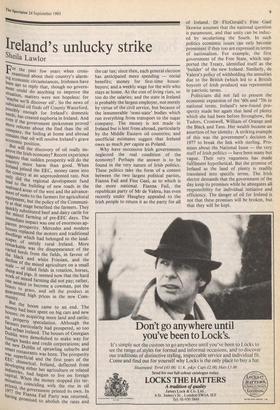Ireland's unlucky strike
Sheila Lawlor
economic circumstances, Irishmen have been apt to reply that, though no For the past few years when cross-
examined about their country's alarm- in
s govern- Merit could do anything to improve the satiation, matters were not hopeless: for 'IllaYbe we'll discover oil'. So the news of substantial oil finds off County Waterford, P°ssiblY enough for Ireland's domestic needs, has created euphoria in Ireland. And even if the government spokesman proved ' More reticent about the find than the oil company, the feeling at home and abroad remains that oil will resolve Ireland's grave economic position.
Rut will the discovery of oil really im-
prove the Irish economy? Recent experience suggests that sudden prosperity will do the country more harm than good. When Ireland
the joined the EEC, money came into country at an unprecedented rate. Not
lead did the regional development fund 'au to the building of new roads in the seaboard areas of the west and the advance- ment of sums to the farmers for agricultural etrYlat that stage benefited the farmers. They
fited
uiPment, but the olicy of the Communi- ttlicklY substituted beef and dairy cattle for the mixed farming of pre-EEC days. The unrnediate impact was one of enormous ap- rouses replaced the motors andand traditional arent prosperit Mercedes modern d, wellin gs which had belonged to the land- rev ar'es of untidy rural Ireland. More ntarkable was the disappearance of the aried herds from the fields, in favour of dme black and white Friesian, and the se cline of the mixed agriculture on a small sell* — of tilled fields in rotation, horses, work and pigs. It seemed now that the hard 0 of mixed farming did not pay; rather, bne needed to become a cowman, put the guarantee to grass, and sell the product at. Guaranteed high prices in the new Com- munit y, Rut the boom came to an end. The hIllemeY had been spent on big cars and new c3u
on
ses; on acquiring more land and cattle; farm OroPerty speculation. Although the ers particularly had prospered, so too had urban Ireland. The houses of Georgian Dublin were demolished to make way for foreign
n-
the banks and credit corporations; and new Dublin of sprawling suburbs and smart restaurants was born. The prosperity tw,as superficial and the first years of the ce chimerical. Ireland, deflected from taevelop
ing either her agriculture or related Industries, had begun to live on foreign capital. When the money stopped (its ter- ati
thin When coinciding with the rise in oil 11,,rices), the government printed its own. In hi -1'7 the Fianna Fail Party was returned, hay, Promised to abolish the rates and
the car tax; since then, each general election has anticipated more spending — social benefits; money for first-time house- buyers; and a weekly wage for the wife who stays at home. As the cost of living rises, so too do the salaries; and the state in Ireland is probably the largest employer, not merely by virtue of the civil service, but because of the innumerable 'semi-state' bodies which run everything from transport to the sugar company. The money is not made in Ireland but is lent from abroad, particularly by the Middle Eastern oil countries; and unofficial estimates suggest that Ireland owes as much per capita as Poland.
Why have successive Irish governments neglected the real condition of the economy? Perhaps the answer is to be found in the very nature of Irish politics. These politics take the form of a contest between the two largest political parties, Fianna Fail and Fine Gael, as to which is the more national; Fianna Fail, the republican party of Mr de Valera, has even recently under Haughey appealed to the Irish people to return it as the party for all of Ireland. Dr FitzGerald's Fine Gael likewise assumes that the national question is paramount, and that unity can be induc- ed by secularising the South. In such politics economic issues can only become prominent if they too are expressed in terms of nationalism. For example, the first government of the Free State, which sup- ported the Treaty, identified itself as the 'builder' of the new Ireland. Similarly, de Valera's policy of withholding the annuities due to the British (which led to a British boycott of Irish produce) was represented in patriotic terms.
Politicians did not fail to present the economic expansion of the '60s and '70s in national terms. Ireland's new-found pro- sperity made her again that land of plenty which she had been before Strongbow, the Tudors, Cromwell, William of Orange and the Black and Tans. Her wealth became an assertion of her identity. A striking example of this was the government's decision in 1977 to break the link with sterling. Pro- mises about the National Issue — the very stuff of Irish politics — have been many but vague. Their very vagueness has made fulfilment hypothetical. But the promise of Ireland as the land of plenty is readily translated into specific terms. The Irish elector demands that the government of the day keep its promises while he abnegates all responsibility for individual initiative and efficiency. The danger of oil for Ireland is not that these promises will be broken, but that they will be kept.






































 Previous page
Previous page